The French Revolution wants no introduction. It is likely one of the most iconic occasions on this planet, not simply in restructuring politics in Europe but in addition in shaping the artwork scene, and that’s why I’m sharing these French Revolution work with you right this moment.
Once we consider the French Revolution, we don’t simply consider how France was getting ready to financial failure or how King Louis XVI and his spouse, Marie Antoinette, confronted demise.
We additionally take into consideration how the occasions impressed artists to create a few of the greatest work the world has seen.
Throughout this era, portray was a medium to inform the story of the rebel and protect historical past.
Additionally, many artists needed to be taught new inventive expressions and approaches, thus altering the artwork society eternally. On this article, we take a look at some well-known French Revolution work, the genius behind them, and what they symbolize.
12 Iconic French Revolution Work You Must Know
1. Tennis Court docket Oath by Jacques-Louis David

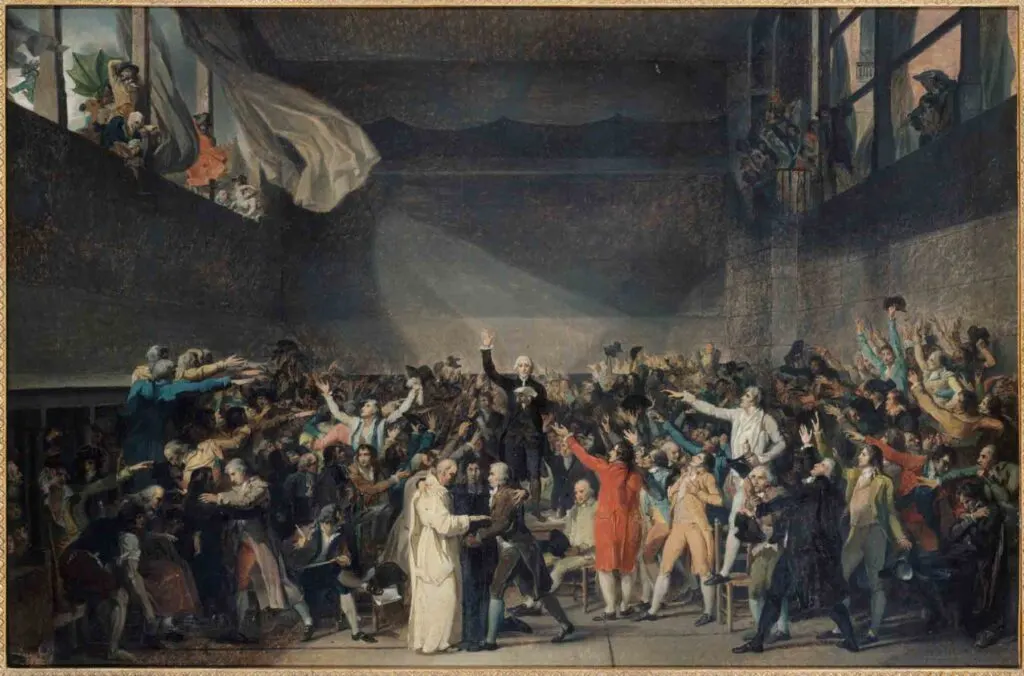
Jacques-Louis David’s feedback on the French Revolution have been evident in his unfinished portray that confirmed the second when members of the Third Property have been taking the Tennis Court docket Oath within the 18th century.
The elected members of the Third Property shaped the Nationwide Meeting and someday gathered within the Tennis Court docket close to the royal palace to take an oath to remain collectively till they’d established a structure.
This can turn into one of many founding occasions of the French Revolution.
Tennis Court docket Oath by Jacques-Louis David, a French painter, serves to protect this second in historical past when deputies of the nation took an oath collectively.
David paid consideration to each element so that each member who took the collective oath (and one who didn’t take it) might be recognized from the portray.
A tragic reality about this portray is that Jacques-Louis David couldn’t end the art work as a result of an absence of funding.
However the portray’s incompleteness made it much more significant after 1793 when a lot of the revolutionaries depicted within the art work had fragmented and turned enemies of the revolution.
The place to see it: Musée nationwide du Château de Versailles.
2. Liberty Main The Individuals by Eugène Delacroix
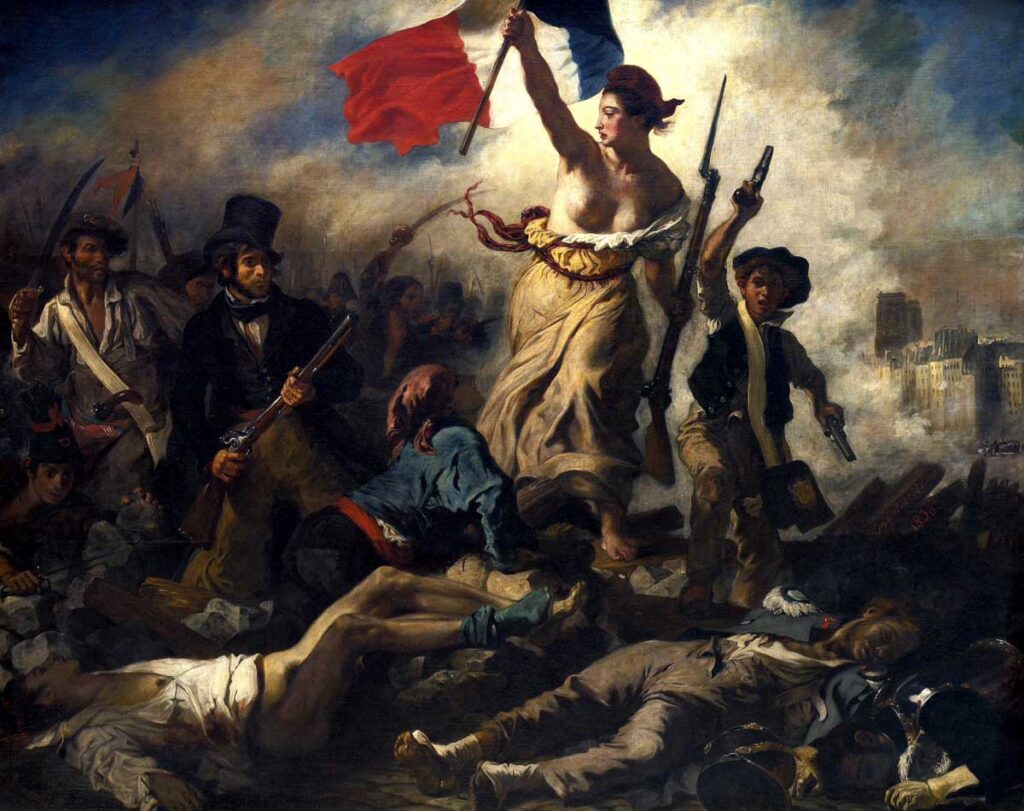
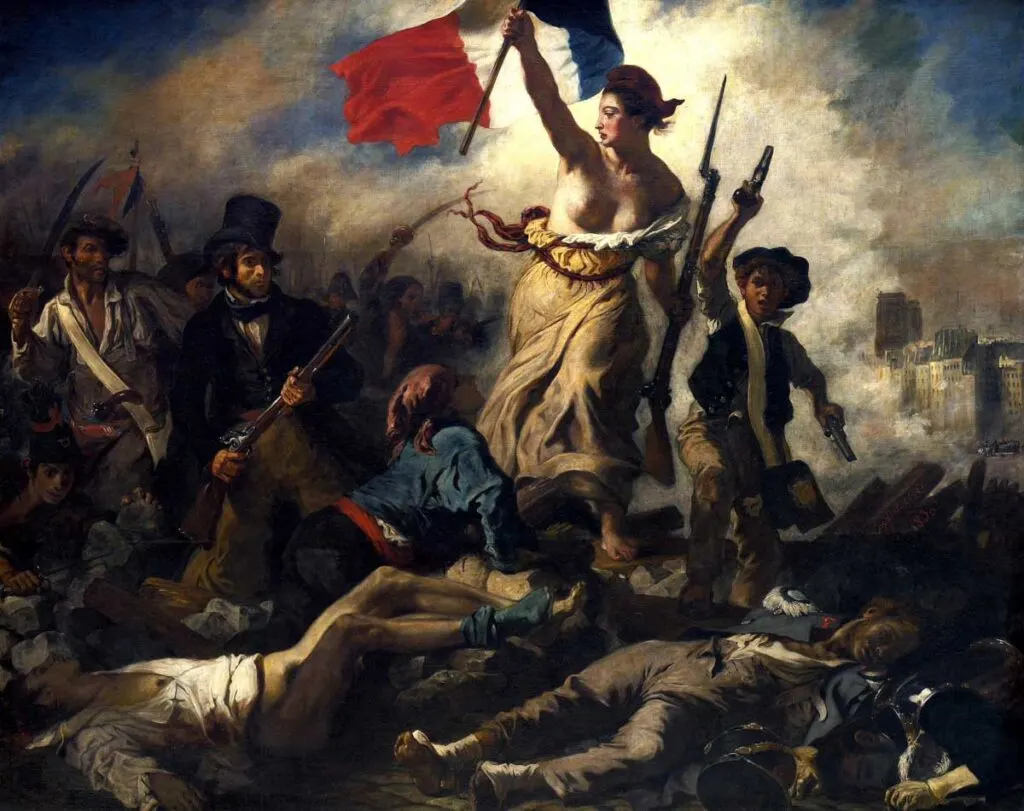
Eugène Delacroix, like many Romantic artists, was identified for his fascination with revolutions and leaders.
Certainly one of his most well-known French Revolution work, Liberty Main the Individuals, addresses the future of his nation within the nineteenth century and brings to life the occasion that introduced in regards to the beginning of a nation.
One of many attention-grabbing issues about Delacroix’s portray is that it didn’t depict any scene from the revolution, in contrast to different French Revolution work.
As a substitute, it reveals a personification of liberty (a bare-breasted lady) elevating the tricolor French flag whereas marching over corpses, assumed to characterize those that died through the struggle for freedom.
The freedom determine was surrounded by revolutionaries of various lessons, which critics mentioned was the artist’s manner of stressing how French individuals wanted to unify to struggle for a brand new nation.
In Delacroix’s view, the beginning of a nation took the blood spillage and sacrifice of many individuals. Liberty Main the Individuals is thought to be one of many best French Revolution work and among the best arts within the Romanticist fashion.
The place to see it: Liberty Main is likely one of the work within the Louvre Museum.
3. Marie-Antoinette Being Taken To Her Execution by William Hamilton


William Hamilton was a British artist intrigued by the French Revolution, particularly the demise of the mighty queen Marie Antoinette, one of the crucial well-known French individuals.
On this portray, the extravagant queen was wearing white, wanting like a bride till you take a look at her face, which was stamped with sorrow.
The portray reveals some troopers wearing black (a distinction to her white costume!) and able to take the queen to her execution whereas holding again her crown.
Maybe probably the most attention-grabbing factor about this portray is the truth that the previous queen regarded like she was resigned to her destiny, accepting that nothing might save her from the trend of her jailers.
The place to see it: Museum of the French Revolution.
4. Illustration of the Declaration of the Rights of the Man and Citizen by Jean-Jacques-François Le Barbier

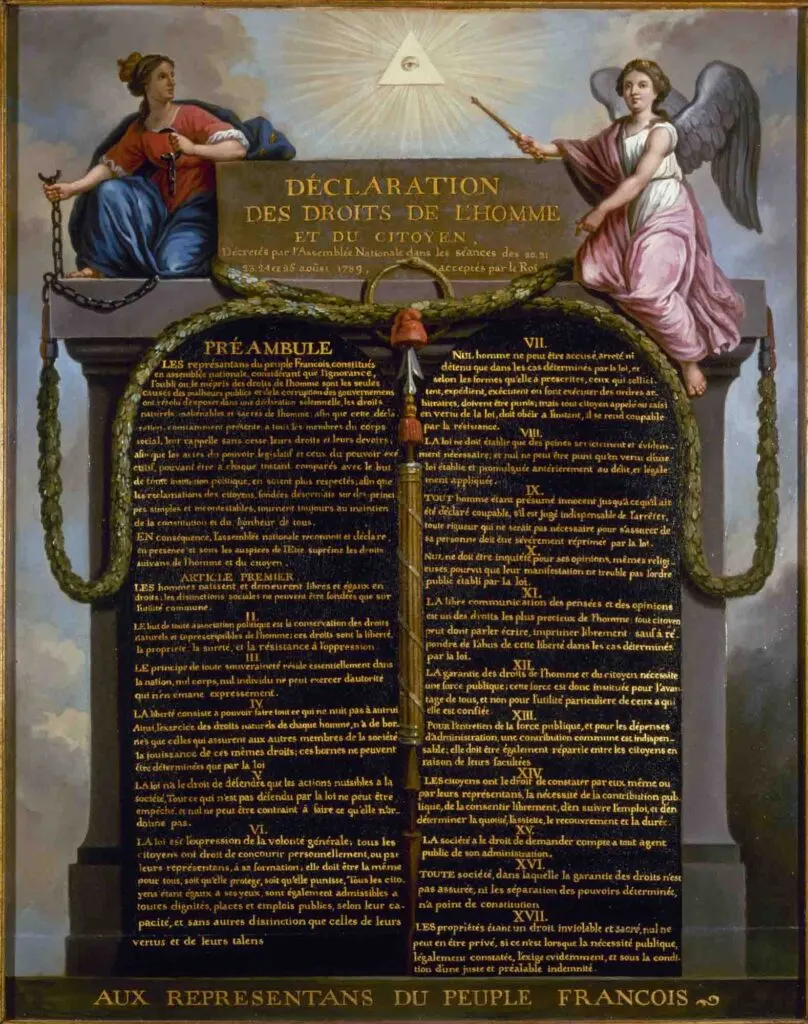
This French portray was impressed and named after the revolutionary doc developed by the brand new regime in 1789.
This doc was printed on the time of the declaration to unfold the message of the core values of the revolution all through the nation.
It was additionally designed to be hung in public locations so individuals might see what the Meeting was doing. Le Barbier’s well-known work represented this doc, The Declaration of the Rights of Man and the Citizen.
It’s additionally attention-grabbing to notice that Le Barbier was an official courtroom painter for King Louis XVI earlier than the revolution.
The place to see it: Musée Carnavalet.
5. The Storming Of The Bastille by Jean-Baptiste Lallemand


Jean-Baptiste Lallemand specialised in panorama portray, and his well-known work, The Storming of the Bastille, recorded the turbulent interval in French historical past.
Here’s a little historic story: On July 14th, 1789, France noticed the autumn of the Bastille after a crowd stormed the jail fortress the place the French King incarcerated those that opposed his monarchy. The 14th of July is now a nationwide vacation in France often known as Bastille Day.
Bastille represented the oppressive nature of the monarchy, and its storming led to the start of the French Revolution.
The Storming of the Bastille serves as a visible report of this pivotal second in historical past, showcasing the autumn of the fortress by means of Jean-Baptiste’s eyes as a survivor of the Revolution.
What makes this portray particular is its lack of grandeur. For instance, you cannot make out any detailed faces from the portray; there is no such thing as a protagonist or primary character.
As a substitute, we see confused figures misplaced in motion and partaking fiercely in a battle with the Bastille within the background.
Individuals have talked about that this is likely one of the French Revolution work that reveals the struggling and violence that went into getting the Monarchy out of energy.
There’s something simply stunning in regards to the messy illustration of the Revolution slightly than the polished model depicted by different work of the French Revolution.
The place to see it: Musée Carnavalet Paris.
6. Une Exécution Capitale, place de la Révolution by Pierre-Antoine Demachy
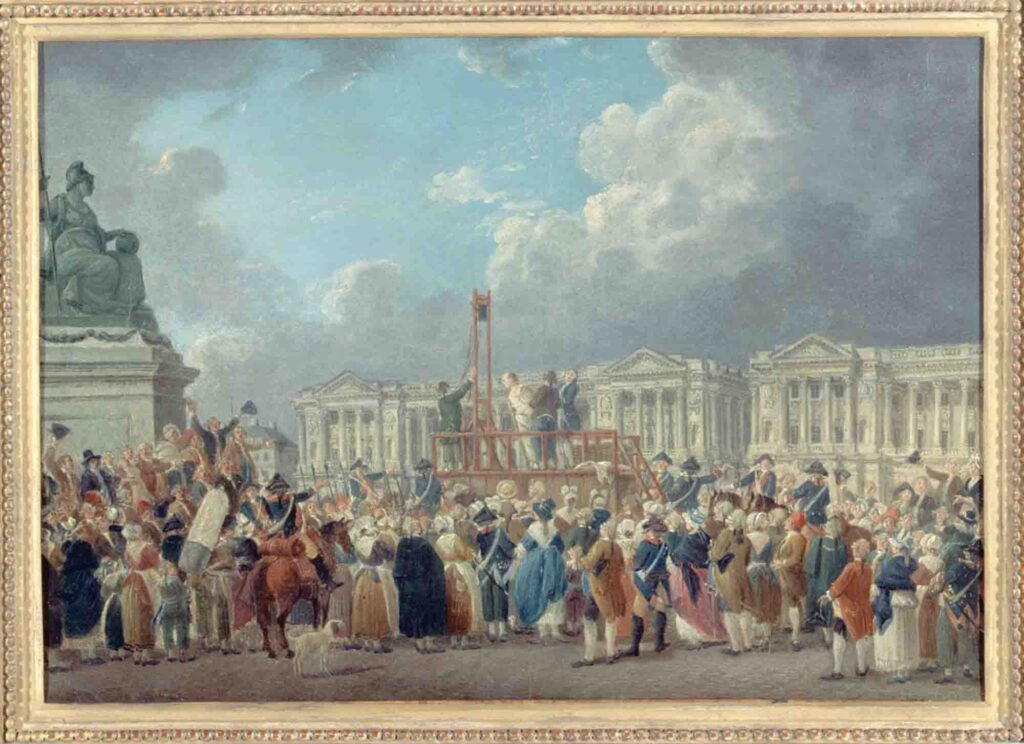

Pierre-Antoine Demachy was a regarded artist even earlier than the French Revolution, and his work targeted on historic ruins and structure.
Demachy added to the French Revolution artwork by means of some work, however one of the crucial highly effective is Une exècution capitale. This portray depicts the La Place de la Concorde, a public sq. within the capital of France that skilled vital occasions of the revolution.
Une Exècution capitale was painted in 1793 through the early days of the Reign of Terror and reveals the execution of a counter-revolutionary on the public sq. whereas a contented crowd surrounded the guillotine.
One factor of curiosity is that the general public sq. was used for the marriage celebration of Louis XVI and Antoinette.
In the course of the occasion, a firework accident occurred, killing about 3,000 members of the viewers. Some years later, Louis XVI and Antoinette have been each executed in the identical public sq., and this web site would see many extra executions.
The place to see it: Musée Carnavalet Paris.
7. The Dying Of Marat by Jaques-Louis David

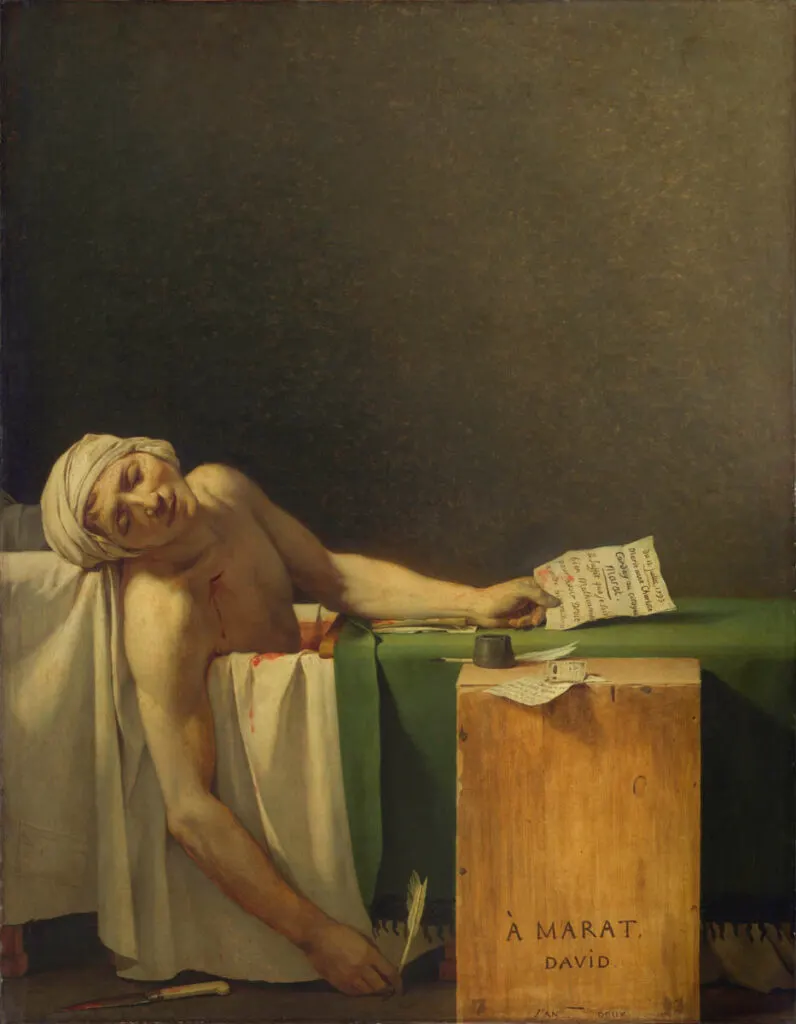
Painted in 1793 by Jaques-Louis David, The Dying of Marat depicts the Jacobin chief, Marat, mendacity in blood, taking his remaining breaths in a coated bathtub whereas holding onto a chunk of an unfinished letter.
This portray symbolizes the assassination of Jean-Paul Marat in July 1793 after he was accused of being concerned within the Reign of Terror, which witnessed the execution of over 15,000 individuals.
In response to the story, a girl stabbed Marat to demise whereas he was engaged on a publication in his toilet.
Marat was well-known for writing revolutionary messages in publications, and his demise made the political state of affairs extra grotesque in order that anybody thought-about counterrevolutionary was executed with out a trial.
David portrayed Marat on this portray as some Christian martyr with mild distributed throughout his physique. On the identical time, the toilet was relegated to a darkish abyss in order that it targeted on his physique.
Christian work usually portrayed martyrs in a holy glow, so it was mentioned David borrowed from this portray fashion to depict Marat as a brand new saint of a brand new political order.
The place to see it: Musée Oldmasters Museum.
8. Marie Antoinette with the Rose by Élisabeth Louise Vigée le Brun
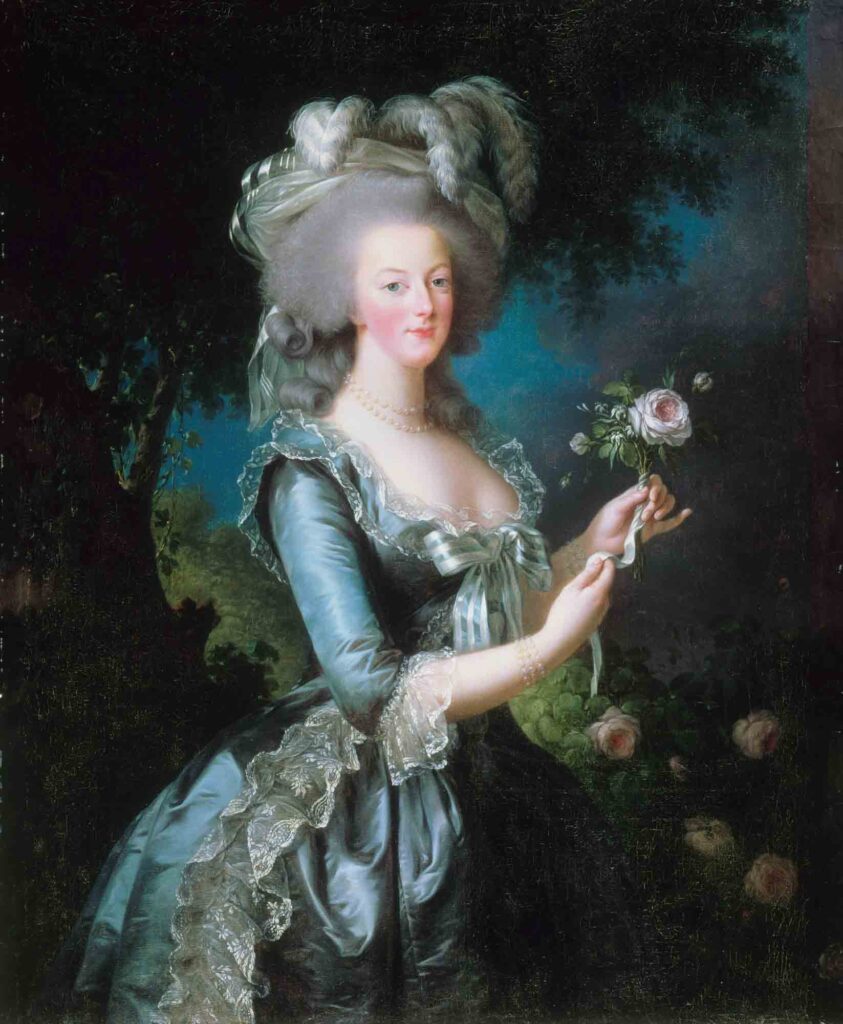
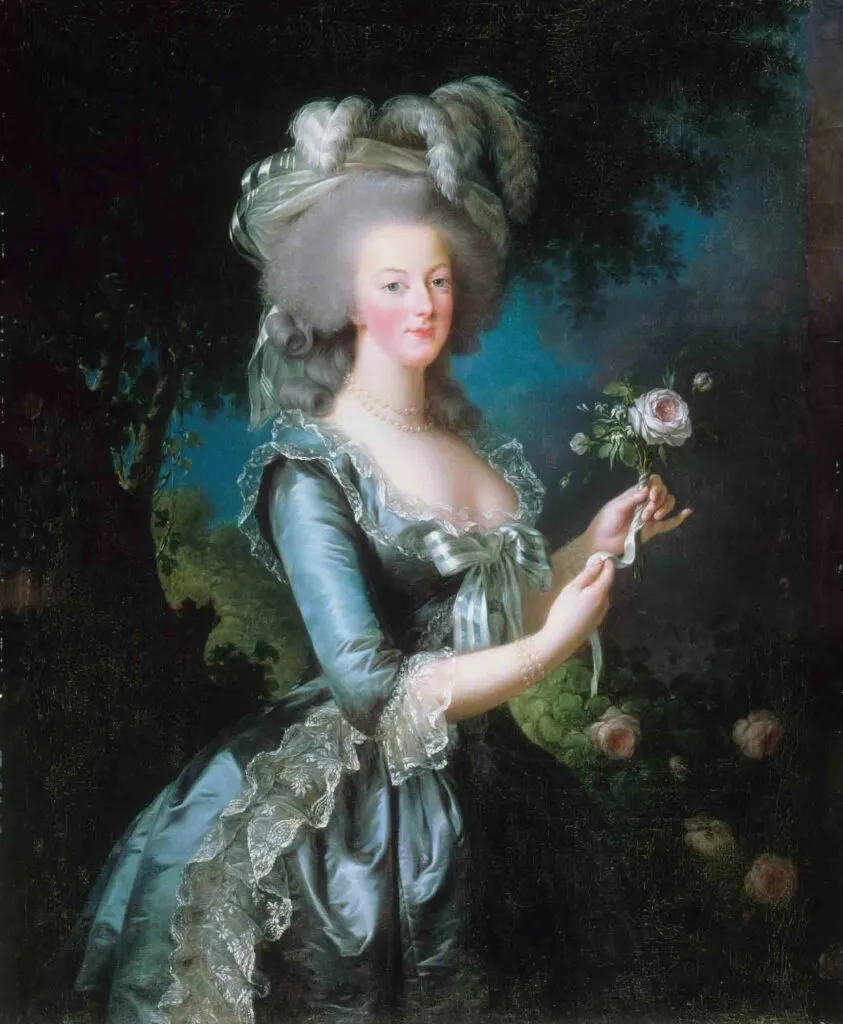
Marie Antoinette, Queen of France, lived a decadent way of life, and on this portray, she was carrying an expensive silk costume whereas holding a rose.
The queen commissioned Elisabeth Louise Le Brun to make a portrait of her for the Salon that 12 months, and she or he initially made a portrait of the queen in a chemise, a rural costume.
The organizers the place Le Brun needed to current the portray discovered the outfit insulting for a queen of France, so that they withdrew it from the Salon.
To deal with this criticism and get her work accepted, Le Brun painted Marie Antoinette with the rose, a chunk acquired in celebrations.
The second portray portrayed Antoinette precisely as she was: an extravagant queen out of contact with the fact of the residents.
The place to see it: Palace of Versailles.
9. The Lictors Carry to Brutus the Our bodies of His Sons by Jacques-Louis David

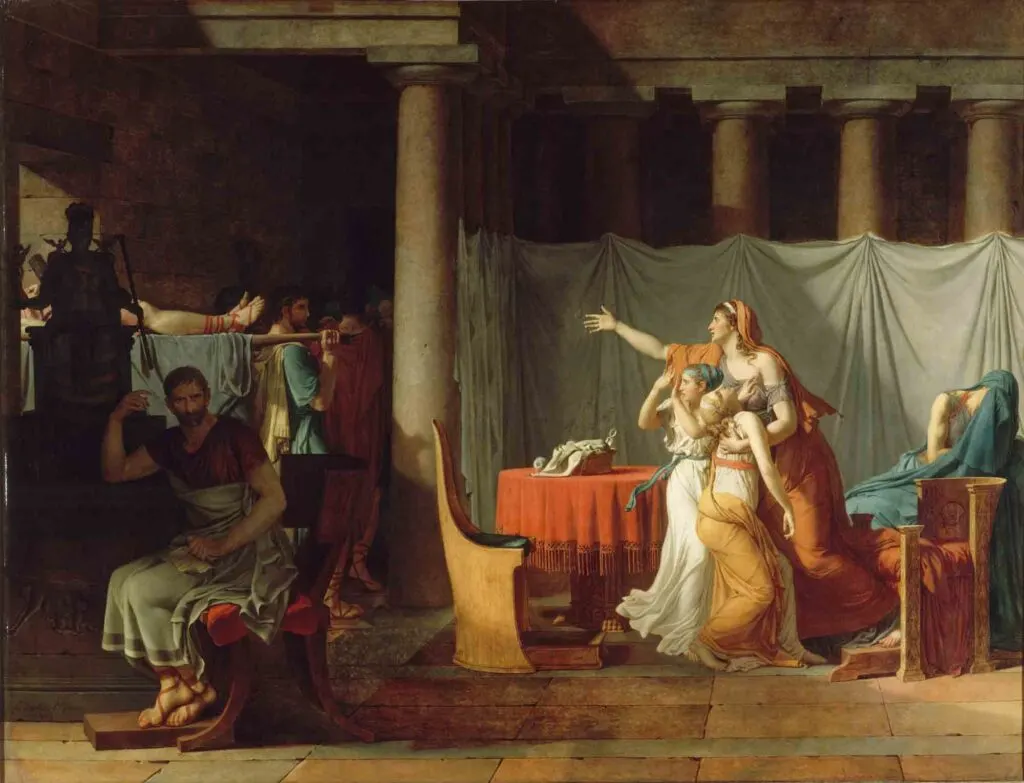
A number of the most well-known French Revolutionary work have been made by Jacques-Louis David, an bold artist who aspired to fame by portray noble and heroic figures.
This portray reveals an essential topic from Rome’s previous, Brutus, however the scene within the portray was almost certainly invented as there is no such thing as a proof of it taking place.
The scene depicts the aftermath of the execution of the sons of Lucius Junius Brutus after they deliberate to revive the overthrown monarchy.
The punishment for this was execution, and to function an excellent instance, Brutus ordered the execution of his personal sons.
There may be one factor imprecise about this portray: Brutus had an unexpressive demeanor, so that you couldn’t inform whether or not he was happy with selecting the preservation of his nation over his household.
Brutus wasn’t the one character on this art work; there was additionally his spouse and daughters who appeared fragmented from him. They regarded shocked and unhappy, and a nursemaid hid her head in dismay.
The place to see it: Louvre Museum.
10. Portrait of a Revolutionary by Jean-François Sablet
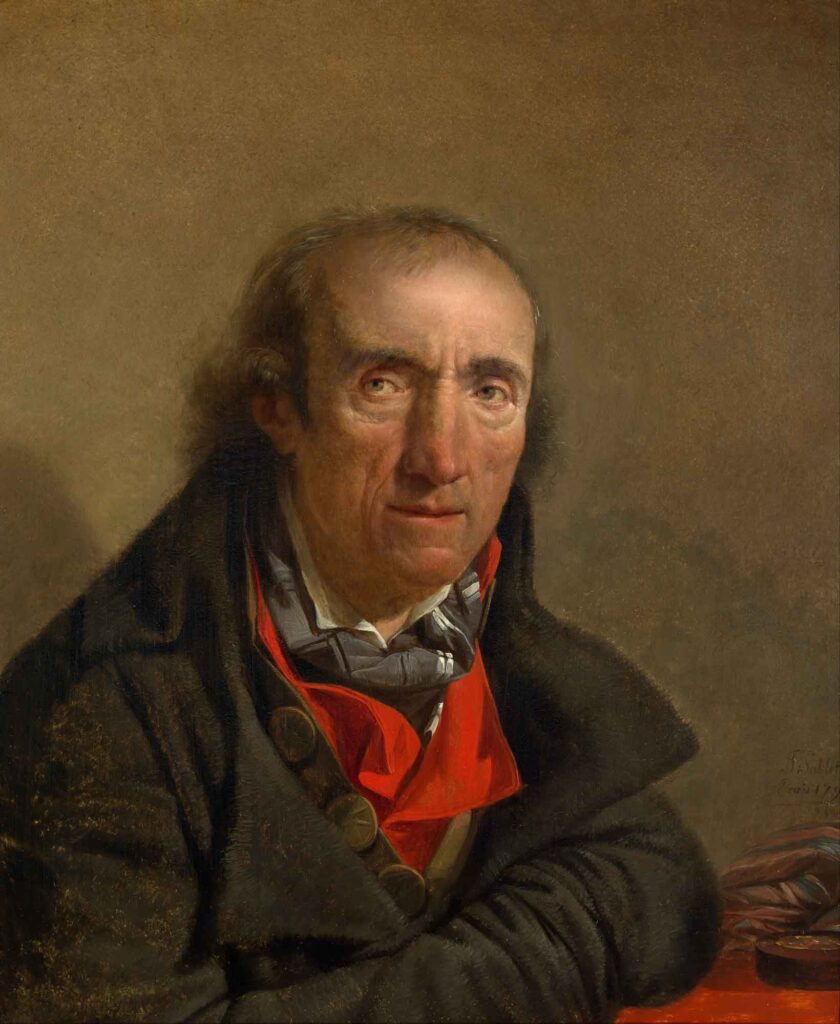
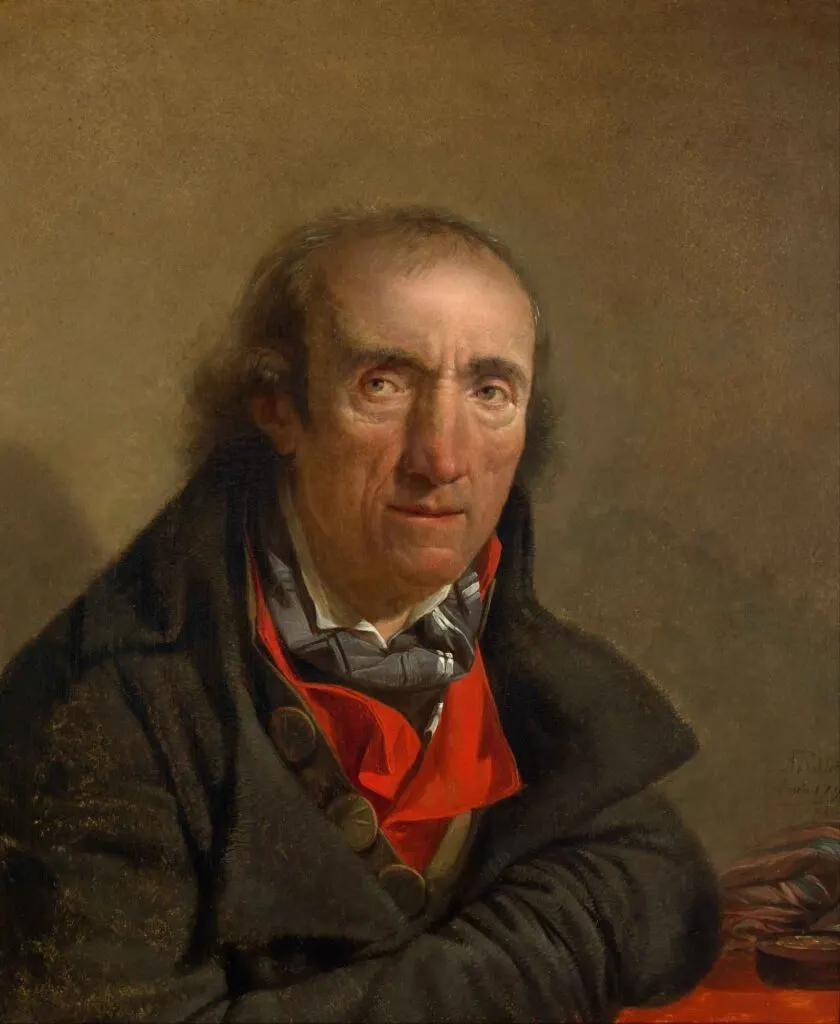
Jean-Francois Sablet produced numerous portraits through the Revolution, together with one by Joseph-Agricol Viala and Lycurgus.
This specific portray, dated 1784, displayed a portrait of an older man. The unidentified outdated man confirmed indicators of revolution together with his pink, white, and blue waistcoat, cravat, and a spherical field containing a badge of workplace/cockade.
In the course of the French Revolution, many younger Frenchmen have been enlisted for army service, leaving older generations to function house guards and different civic duties.
The sitter of this portrait was an officer of the native authorities on the Municipalité.
One of many highlights of this portray was how Sablet was in a position to painting the state of the French authorities by means of the options of the outdated man within the portrait.
The person has a severe demeanor and sunken eyes that by some means characterize the phobia and bloodshed that had begun at the moment.
The place to see it: Nationwide Gallery of Victoria.
11. Napoleon on the St. Bernard Move / Napoleon Crossing the Alps by Jacques-Louis David


Napoleon Crossing the Alps was painted between 1801 and 1805 by Jacques-Louis David to commemorate the crossing of the St. Bernard go by the military reserve in Could 1800.
After years of tumultuous occasions, France was edging in direction of a brand new century with Normal Napoleon on the entrance run. He had turn into the First Consul after staging a profitable coup d’etat in opposition to the revolutionary authorities.
Additionally, the occasion that led to this portray was him main his troops throughout the Alps in a army marketing campaign in opposition to the Austrians on the Battle of Marengo.
His achievement was depicted within the portray with him on a horse and carrying his uniform on the Battle of Marengo.
This French portray was alleged to be a correct portrait of Napoleon, however Jacques-Louis David talked about that the highly effective man supplied little help through the portray course of.
For instance, Napoleon refused to take a seat for the portrait, so David needed to search inspiration from an earlier portrait of him. Nevertheless, Napoleon was the one who prompt the concept of getting him on a fiery horse to exhibit his power and composure.
Napoleon Crossing the Alps stays one of the crucial common portraits of Napoleon Bonaparte and was commissioned by the then King of Spain, Charles IV.
The place to see it: Châteaux de Malmaison.
12. Demolition of the Chateau Meudon by Hubert Robert


Huberty Robert narrowly escaped execution through the revolutionary regime as a result of his apolitical stance, and but he contributed to the physique of French Revolution work.
Robert, also called Robert of the Ruins as a result of his love for portray ruins, spent 11 years in Rome, perfecting his abilities and turning into well-versed in Romanticism.
Within the Demolition of the Chateau Meudon, Robert painted the Chateau of Meudon underneath a sun-drenched sky.
This web site served because the royal residence and was one of many best French monuments till it was ransacked and demolished through the revolution.
Robert was praised for his capriccio ability on this portray, for he might combine options of the Chateau that now not existed.
Moderately than doc the positioning’s demolished state, Robert painted the Chateau as barely ruined, thus mixing reality and fiction to depict the previous significance of the constructing.
The place to see it: Getty Middle in LA.
Don’t Overlook About Journey Insurance coverage!
Earlier than you allow for France, be sure you have a sound journey insurance coverage coverage as a result of accidents occur on the highway. We’ve been paying for Security Wing journey insurance coverage for slightly over a 12 months now, and we fortunately advocate them to our household and pals.
When you get sick, injured, or have your stuff stolen, you may be pleased to have the flexibility to pay on your medical payments or exchange what was stolen.
As a result of, for simply a few {dollars} a day (relying on how lengthy your coverage is for), you are going to get numerous issues coated. Be good and get journey insurance coverage.

